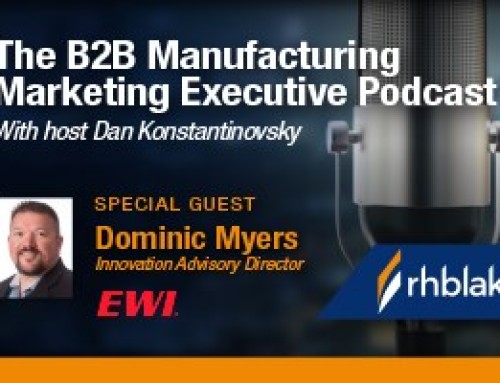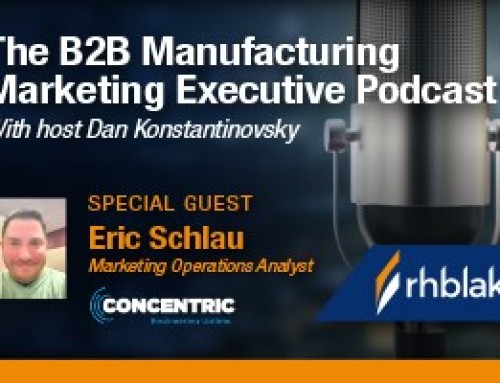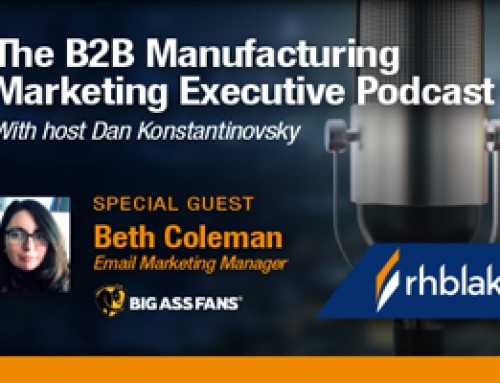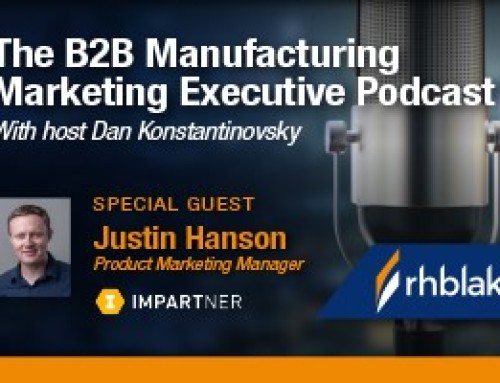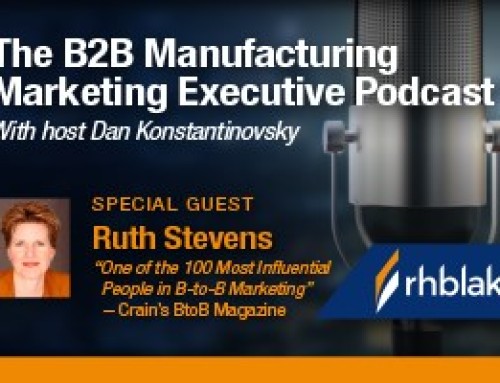Interview with Shana Relle
Welcome to the B2B Manufacturing Marketing Executive Podcast.
If you want to learn how leading B2B Marketers are achieving excellent growth results, you are in the right place. This episode is brought to you by R. H. Blake a leading B2B and manufacturing focused marketing agency. To learn more, visit rhblake.com. Now here is your host Dan Konstantinovsky.
 Everybody thank you very much for joining us today. We are here with Shana Relle . She is a marketing operations manager with Intralox and for those that are familiar, Intralox is a global leader of Conveying solutions they help numerous industries including automotive food industrial and really participating in more than 100 countries. And Shana is the marketing operations manager and we’re really excited to have her on because she in her role sees the marketing department from a little bit of a different perspective than than we all do. And she manages the in-house marketing team there which is comprised of digital marketers, project managers, tradeshow coordinators and she helped set the department’s strategy in how to optimize use of resources. So she functions almost as a marketing agency within a brand which is a really neat role and in provides a very unique perspective on marketing. And how maybe agencies can help her but also the requirements of the different brands so we’re really excited to have her on.
Everybody thank you very much for joining us today. We are here with Shana Relle . She is a marketing operations manager with Intralox and for those that are familiar, Intralox is a global leader of Conveying solutions they help numerous industries including automotive food industrial and really participating in more than 100 countries. And Shana is the marketing operations manager and we’re really excited to have her on because she in her role sees the marketing department from a little bit of a different perspective than than we all do. And she manages the in-house marketing team there which is comprised of digital marketers, project managers, tradeshow coordinators and she helped set the department’s strategy in how to optimize use of resources. So she functions almost as a marketing agency within a brand which is a really neat role and in provides a very unique perspective on marketing. And how maybe agencies can help her but also the requirements of the different brands so we’re really excited to have her on.
About Shana Relle
 Shana Relle is a Marketing Operations Manager with Intralox, a global leader of Conveying solutions for numerous industries including automotive, food and industrial. With a total of approximately 35 Marketing team members, Shana manages the operations production group which is comprised of digital marketers, a project management team, tradeshow coordinators and collaborates with other stakeholders to help set the department strategy.
Shana Relle is a Marketing Operations Manager with Intralox, a global leader of Conveying solutions for numerous industries including automotive, food and industrial. With a total of approximately 35 Marketing team members, Shana manages the operations production group which is comprised of digital marketers, a project management team, tradeshow coordinators and collaborates with other stakeholders to help set the department strategy.
You’re welcome. And let me just add to that. So our marketing department has about 35 people give or take. I’m not exactly sure where we are at the moment. I’m overseeing the operations Production Group which you mentioned earlier is trade shows digital marketing and project management. We collaborate really closely with two other groups within that marketing department and that is comprised of marketing strategy with marketing strategists reporting and working collaboratively with each of our business units. And then the creative team. So that includes our designers and videographers and copywriters and so on.
So we’re actually a pretty robust in-house marketing department!
Well, yes thank you. Thank you for providing that additional insight there. You’re absolutely right. Especially compared to many manufacturers that is a very robust marketing group. And so kind of from your perspective, many of us marketers, especially industrial space, see marketing changing so quickly. And recently there was a report from Adobe, that you know over maybe the past year or so, 76 percent of us industrial marketers think that marketing has changed more in the past year or so than it has maybe in the previous 50.
Just wanted to get your kind of sense on how from your perspective where do you see marketing going. Is it changing that quickly for you as well. If you could just maybe provide your feedback there.
I did notice a large amount of change in two areas. The first is that vendors out there are offering various types of tools to manage work which is interesting on the marketing operations side. Some examples of this are content management systems. We have project management tools and analytics tools. And then second, there are so many more channels available for marketers to connect with audiences in B to B, a few examples of that that we’ve seen over the most recent years our company’s Web site, YouTube channel, industry blogs, podcasts like this one, AdWords efforts, and truly the amount of time people spend online enables marketers to connect with them at any hour.
What hasn’t changed is for marketing outputs to be effective they still need a clear purpose, that purpose should resonate with intended audience at the appropriate time and produce a desired action. I imagine we’ll continue to see change. Certain services, channels and tools will win out but other ones will come into play. I don’t see that slowing down.
As discussed, any output including content requires a clear purpose and a clearly defined audience. Marketers should know what they’re trying to say and they should know that what their purpose is. Are they trying to generate traffic via SEO efforts or your content at engaged followers on LinkedIn? The marketer should consider. if the purpose is to engage an audience over a long period of time or to generate a quick call to action. Over time marketers should have a very clear understanding of what to say to the audience and how to say it.
Our department follows brand standards to ensure a high quality look and feel and we rely on our industry team experts to ensure that content accuracy and content interest as well. So to check effectiveness is essential to measure results and to improve with each post. We consider if the topic format in length resonates with our audience and our company’s employees. Our sales team members are our brand and message amplifiers. So we aim to create content that they feel is worthy of sharing with their contacts. So if we create something that nobody on our team is sharing, nobody in the sales team are sharing, we have a pretty good indication that maybe we need to adjust in the future.
Shana Relle
Marketing Operations Manager
Intralox
Well as I mentioned a little earlier, each of our marketing strategist report into a business unit so they’re pretty closely aligned with the industry trends and the industry needs. They’re also really aligned when it comes to creation of a marketing output. And as we are developing things, we’re constantly bouncing it off of our experts be it salespeople, somebody with a new product development, an application engineer, you name it. We are really integrated with our commercial team members to make sure that we’re not doing marketing for the sake of marketing but we’re doing marketing for the sake of telling the people that we’re interested in talking to, something that would be beneficial for them during their sales process and the buying cycle.
Yes, that can be really tough. I would say that probably is one of our top struggles within the marketing department but we really do rely on those marketing strategists to foster relationships within their commercial teams. And the way that they do that is by putting out good results. So the more positive results the commercial team is seeing from marketing, the more apt they are to use more marketing and the more apt they are to when marketing is looking for content or for input about an upcoming trade show. They have more trust and more interest and therefore they’re more open to collaborating.
And of course stakeholder management is not a marketing strength necessarily, but as a marketer stakeholder management is a really important skill to have.
What we find is that the marketing strategists who have those strong relationships they are the ones who benefit from communicating.
Well we could say “oh the whole marketing department, we’re gonna just go ahead and blast out an email to everyone letting them know about what were the top campaigns this year and what was the result”. We are a big company and we serve a lot of industry, so doing that is a little tricky for two reasons; one is not everyone on every team cares about what every other segment team is doing; the other thing is they don’t necessarily know who’s in the marketing department but they do know their marketing strategist. So if the strategist can work really closely with the team to define “what are we trying to accomplish and “how can marketing help” and then say how are we going to measure that and get kind of a buy in from the commercial team members. Then when we set off and do it we can share those results and they mean something to the commercial team.
So you know there might be analytics that a salesperson doesn’t care about, maybe they don’t care about how many people visited a website, a web page or downloaded a white paper. But maybe what they do care about is how many people called based on reading that white paper. And so these are the types of information we might be pushing out to those commercial team members.
Yeah. The perfect marketing hire is a great exciting concept. The perfect hire would have four main capabilities. So I will list them out and then I’ll tell you a little bit more about them. The first would be a functional area of expertise. Second industry curiosity. Third would be analytics curiosity. And the fourth would be a mastery of the basics.
First functional area expertise. Team members should have a marketing discipline or maybe two or more that they excel at. It could be for example marketing strategy, design, copywriting, marketing project management or maybe trade show execution.
Second industry curiosity. At Intralox, a team member is likely not an expert on conveyor belts when he lands the job but he can quickly understand what he needs to know if he is fascinated by the products we offer, the uses of the products and our buyers. As you and I know Dan industrial products and the way they’re made sold and used is pretty fascinating. Which is why we’re still doing what we do. We and the teams we work with have industry curiosity. I’d also include analytics curiosity to be a stellar hire, that perfect hire wants to know how her work performed out there in the world.
Analytics doesn’t need to be a person’s primary function but if you’re a designer or a copywriter or strategist wanting to learn about performance makes you better at your job. So if that person doesn’t possess analytic skills, it’s pretty easy to find somebody within the department who does. And finally I would say a mastery of the basics is pretty important in a new hire. There are a few key ones that would be important to excel at including an ability to meet deadlines, an ability to communicate with team members to accomplish projects efficiently and have a very pleasant way for all involved, and also the willingness to adapt work based on learning.
So as we talked about earlier, being curious about analytics is great and learning from it. But you have to be willing to change based on what you’ve learned. Not all results are good. So some team members shy away from looking at them or they take results personally. That ideal hire is open to iteration and an improvement in their own work.
For me, if somebody has a functional area of expertise you know maybe today we have a digital marketer that is able to use certain programs and understand certain analytics. Maybe that changes slightly in the future but still that basic idea of having functional expertise that’s important. First and foremost when you hire, I think a really successful person loves their industry. They might not know about the industry when they first get the job. I certainly didn’t think 20 years ago that I was going to be in the conveyor industry, but it’s fascinating and that really drives my work.
I’m excited to see what’s next. Every person I’ve hired has been excited about working for this conveyor company and maybe it’s not because they love conveyors but they love what the company’s products enable other companies to do. Analytics curiosity, I just think you see us getting more and more knowledgeable about what analytics means and we have more access to the analytics. There’s tools out there now where it’s not just the digital strategy and analytics person who has access to the dashboard. It’s a lot more people on the team that can just easily access that information without being sent a report. That enables you to do great work and then the basics. I mean that never goes away. Being able to work with team member is essential to being effective at your job.
Thinking about inter-department communications, I’m very happy with our project management tool. As we mentioned earlier, we’re an in-house agency so we use inMotion as our project management system to manage projects from intake through task completion and it helps us stay on target with deadlines and manage proofing the same way for every project. The second tool that we use is Microsoft Teams which benefits us for collaboration on in progress documents and for knowledge sharing. Both inMotion and Microsoft Teams enables us to have more efficient communications within our department. And again from the marketing operations side this is exciting for me and my role.
I recommend looking at the content on both the Dematic and the Honeywell Intelligrated web sites.
Also I’ve been a long term fan of the photography on the Gates corporation Web site. Their photos make industrial work look interesting and often pretty
Thank you Dan, I enjoyed taking time to be introspective about marketing and operations usually my time is spent thinking about the work to get done and how to get it done. This was a nice break for the day.
Thanks Dan.



